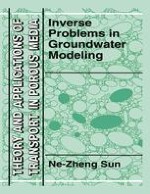1999 | OriginalPaper | Buchkapitel
Experimental Design, Extended Identifiabilities and Model Structure Identification
verfasst von : Ne-Zheng Sun
Erschienen in: Inverse Problems in Groundwater Modeling
Verlag: Springer Netherlands
Enthalten in: Professional Book Archive
Aktivieren Sie unsere intelligente Suche, um passende Fachinhalte oder Patente zu finden.
Wählen Sie Textabschnitte aus um mit Künstlicher Intelligenz passenden Patente zu finden. powered by
Markieren Sie Textabschnitte, um KI-gestützt weitere passende Inhalte zu finden. powered by
The accuracy of identified model parameters and thus the reliability of model predictions depend on the quantity and quality of observation data obtained in the field according to predetermined experimental designs. A good experimental design should give enough information for model calibration while save experimental expenses. Basic ideas and methods of experimental design have been well established in statistics and extensively applied to various scientific and engineering fields (Silvey, 1980; Pâzman, 1986). For groundwater modeling, however, there are some difficulties associated with the design of experiments. First, the observed state variables, such as the head and concentration, are always nonlinear functions with respect to the unknown hydrogeological parameters. Second, the model structure can never be known exactly. Third, the cost of experiments is usually high and the number of observation wells is very limited. Fourth, the experimental scale is generally small to compare with the aquifer scale. Therefore, in the field of groundwater modeling, special considerations should be given to the design of experiments.
